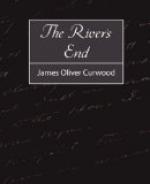To Keith this first experiment in the matter of testing an identity was a disappointment. It was not only disappointing but filled him with apprehension. It was true that Duggan had not recognized him as John Keith, but neither had he recognized him as Derwent Conniston! And Duggan was not a man to forget in three or four years—or half a lifetime, for that matter. He saw himself facing a new and unexpected situation. What if McDowell, like Duggan, saw in him nothing more than a stranger? The Englishman’s last words pounded in his head again like little fists beating home a truth, “You win or lose the moment McDowell first sets his eyes on you.” They pressed upon him now with a deadly significance. For the first time he understood all that Conniston had meant. His danger was not alone in the possibility of being recognized as John Keith; it lay also in the hazard of not being recognized as Derwent Conniston.
If the thought had come to him to turn back, if the voice of fear and a premonition of impending evil had urged him to seek freedom in another direction, their whispered cautions were futile in the thrill of the greater excitement that possessed him now. That there was a third hand playing in this game of chance in which Conniston had already lost his life, and in which he was now staking his own, was something which gave to Keith a new and entirely unlooked-for desire to see the end of the adventure. The mental vision of his own certain fate, should he lose, dissolved into a nebulous presence that no longer oppressed nor appalled him. Physical instinct to fight against odds, the inspiration that presages the uncertainty of battle, fired his blood with an exhilarating eagerness. He was anxious to stand face to face with McDowell. Not until then would the real fight begin. For the first time the fact seized upon him that the Englishman was wrong—he would not win or lose in the first moment of the Inspector’s scrutiny. In that moment he could lose—McDowell’s cleverly trained eyes might detect the fraud; but to win, if the game was not lost at the first shot, meant an exciting struggle. Today might be his Armageddon, but it could not possess the hour of his final triumph.
He felt himself now like a warrior held in leash within sound of the enemy’s guns and the smell of his powder. He held his old world to be his enemy, for civilization meant people, and the people were the law—and the law wanted his life. Never had he possessed a deeper hatred for the old code of an eye for an eye and a tooth for a tooth than in this hour when he saw up the valley a gray mist of smoke rising over the roofs of his home town. He had never conceded within himself that he was a criminal. He believed that in killing Kirkstone he had killed a serpent who had deserved to die, and a hundred times he had told himself that the job would have been much more satisfactory from the view-point of human sanitation if he had sent the son in the father’s footsteps. He had rid the people of a man not fit to live—and the people wanted to kill him for it. Therefore the men and women in that town he had once loved, and still loved, were his enemies, and to find friends among them again he was compelled to perpetrate a clever fraud.




